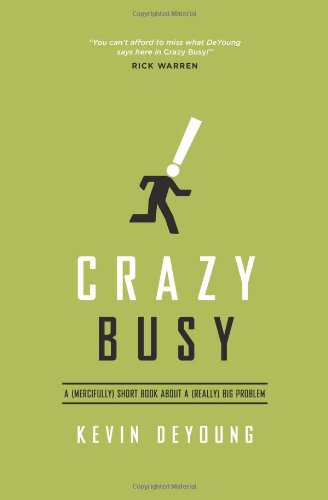Kevin DeYoung is a busy man. He pastors a church, authors books, blogs daily, speaks at conferences, and is raising a large family. How does he find the time? He is, as the popular phrase and now title of his latest book goes, crazy busy. And yet, he did find time to write this book, which is, appropriately, very short at just over 100 pages, though its brevity is probably more for the sake of those who most need to read the book. People like me and perhaps you, too, who are crazy busy.
 In our culture where professionals of all kinds are sometimes expected to be overworked and sleep-deprived, busyness might not necessarily be seen as a bad thing. So DeYoung begins by noting just why busyness is dangerous: It can ruin our joy, distract us from the most important things in life, and even mask deep spiritual rot. As he puts it, “extreme busyness in our lives may point to deeper problems—a pervasive people-pleasing, a restless ambition, a malaise of meaninglessness” (31).
In our culture where professionals of all kinds are sometimes expected to be overworked and sleep-deprived, busyness might not necessarily be seen as a bad thing. So DeYoung begins by noting just why busyness is dangerous: It can ruin our joy, distract us from the most important things in life, and even mask deep spiritual rot. As he puts it, “extreme busyness in our lives may point to deeper problems—a pervasive people-pleasing, a restless ambition, a malaise of meaninglessness” (31).
DeYoung’s discussion is surprisingly confessional, acknowledging his own struggle with over-commitment, thus making him both the worst and the best person to write this book. The sin he identifies as a major root cause of the busyness disorder, as well as other sins, is pride. And in chapter three he explores some of the many manifestations of this vice, as “pride is the villain with a thousand faces” (35). These include perfectionism, the desire for prestige, and the need to please others.
After these diagnostics in the first half of the book DeYoung turns to offering some constructive counsel for warding off the temptation to over-commitment. It all comes down to setting priorities. An obvious truth, perhaps, but one that bears repeating because, as DeYoung notes, we’ll never be able to do all we want to accomplish and we will actually be more effective in serving others if we limit our commitments. This requires discipline, of course, not to mention humility and faith. Humility because we must recognize our own finitude. Faith because we must trust that God will ensure that the tasks we turn down will somehow get done.
In the Internet age there are greater temptations to busyness than ever before. And in chapter seven DeYoung discusses these. Not only are there temptations to addiction to on-line activity but also the concomitant threat of acedia or “purposelessness disguised as constant commotion” (82). So how shall we face this threat? DeYoung’s offers some wise practical counsel in suggesting that we “cultivate a healthy suspicion toward technology and ‘progress’” (85), even to the point that we deliberately opt for the older technologies in favor of new ones (e.g., writing a paper letter) or severely limit our use of them. In any case, he recommends that we “bring our Christian theology to bear” on all of the contemporary technologies that threaten to occupy us without adding much, if anything, in terms of quality to our lives.
Another crucial antidote to vicious busyness is rest, as DeYoung explains in chapter eight. Again obvious but often ignored, proper rest is essential to a healthy body as well as a healthy soul. Ironically, he notes, maintaining a life rhythm that involves adequate rest takes a lot of work. But for many of us it might just be a matter of being disciplined in certain areas where we fritter away time, such as watching television or surfing the Internet.
DeYoung concludes Crazy Busy by reminding us that work is good, a gift from God, and that we are supposed to be busy. What is needed is balance and an appropriate ordering of our lives, where we prioritize the right things, especially the time we spend daily in prayer and reading scripture. These two disciplines, says DeYoung, are the most important means of maintaining overall balance in one’s life. Again, his counsel here is hardly original but actually rather predictable. It is, nonetheless, valuable. Some advice is important enough to warrant the tedium of repetition.

Devon
“…as DeYoung notes, we’ll never be able to do all we want to accomplish and we will actually be more effective in serving others if we limit our commitments. This requires discipline, of course, not to mention humility and faith. Humility because we must recognize our own finitude.” Apparently, I could use to read this book. Although, I am currently embracing FOCUS as the antidote to too much busyness and overcommitment. I love that though: it is TRUE that one of the drives behind me wanting to do everything is a rebellion against my own finitude. I know it.
Hope you all are well.